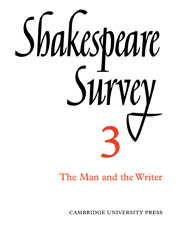Book contents
- Frontmatter
- Studies in the Life and Environment of Shakespeare Since 1900
- Shakespeare’s Deposition in the Belott-Mountjoy Suit
- Shakespeare’s Reading
- Recent Studies in Shakespeare’s Chronology
- Coriolanus and the Midlands Insurrection of 1607
- The Shakespeare Collection in the British Museum
- The Structural Pattern of Shakespeare’s Tragedies
- The ‘Meaning’ of Measure for Measure
- Hamlet and the Player Who Could NOT Keep Counsel
- Unworthy Scaffolds: A Theory for the Reconstruction of Elizabethan Playhouses
- Shakespeare in the German Open-Air Theatre
- Othello in Paris and Brussels
- Shakespeare and Denmark: 1900–1949
- International News
- A Stratford Production: Henry VIII
- The Year's Contributions to Shakespeare Studies: 1 Critical Studies
- 2 Shakespeare’s Life and Times
- 3 Textual Studies
- Index
- Plate Section
3 - Textual Studies
Published online by Cambridge University Press: 28 March 2007
- Frontmatter
- Studies in the Life and Environment of Shakespeare Since 1900
- Shakespeare’s Deposition in the Belott-Mountjoy Suit
- Shakespeare’s Reading
- Recent Studies in Shakespeare’s Chronology
- Coriolanus and the Midlands Insurrection of 1607
- The Shakespeare Collection in the British Museum
- The Structural Pattern of Shakespeare’s Tragedies
- The ‘Meaning’ of Measure for Measure
- Hamlet and the Player Who Could NOT Keep Counsel
- Unworthy Scaffolds: A Theory for the Reconstruction of Elizabethan Playhouses
- Shakespeare in the German Open-Air Theatre
- Othello in Paris and Brussels
- Shakespeare and Denmark: 1900–1949
- International News
- A Stratford Production: Henry VIII
- The Year's Contributions to Shakespeare Studies: 1 Critical Studies
- 2 Shakespeare’s Life and Times
- 3 Textual Studies
- Index
- Plate Section
Summary
A survey of recent textual work in Shakespeare may begin appropriately with companion essays by colleagues at the University of Pennsylvania, one the editor of the Variorum 2 Henry IV; and the other the prospective editor of the Variorum Richard II. Rarely does one find the problems of an editor more delightfully explained. M. A. Shaaber notes the deficiencies of current editions of Shakespeare and describes the potential benefits of several types of edition not now in existence. “It is a strange anomaly”, he points out, “that, while the standard editions of most Elizabethan authors print the spelling of the contemporary books and manuscripts from which it is derived, there has never been a complete edition of Shakespeare in the old spelling. . . . Indeed I think there is room for an edition which would reproduce the most authoritative text of each play with no editing at all except to correct undoubted mistakes and make good undoubted omissions. This would serve chiefly as a convenient substitute for facsimiles. Just so it would be welcome, since there is no complete set of reliable facsimiles of the Quartos and all facsimiles are expensive.” Shaaber is confident that “in the future we can make better texts of Shakespeare than we have to-day”, and he illustrates the possibility by showing how little attention has been paid to the editorial policies and practices of the first Folio by the citation of passage after passage in the fifth Quarto text of I Henry IV that has been altered in the Folio. Pollard’s judgement about the absence of ‘editorial meddling’ in the latter has been reversed by Greg, who is of the opinion that the plays “underwent a good deal of modernization, and general tidying up in spelling, punctuation, grammar, metre, and so on”.
- Type
- Chapter
- Information
- Shakespeare Survey , pp. 143 - 152Publisher: Cambridge University PressPrint publication year: 1950

